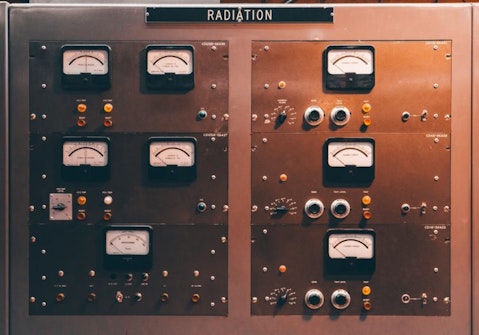In this article, we will look at the 10 best nuclear ETFs to buy now. If you want to explore more nuclear ETFs that you can add to your portfolio, you can also take a look at 5 Best Nuclear ETFs to Buy Now.
Nuclear energy has been the center of bad press for a long time now. Whenever the word nuclear comes to mind, most people recall the Chernobyl and Fukushima Daiichi incidents. These two disasters have had a negative impact on the world and turned it more cautious toward generating energy from nuclear power. However, the benefits of nuclear power over fossil fuels cannot be overlooked. One of the biggest benefits of nuclear energy over matter-dense energy sources, such as fossil fuels, is its lack of carbon emissions. According to the Nuclear Energy Institute, energy generated from nuclear power in the U.S. reduces over 470 million metric tons of carbon emissions every year.
The U.S. draws roughly 50% of its carbon-free energy from nuclear sources. In efforts to battle climate change, on April 19, the Biden administration poured $6 billion into the nuclear energy industry to extend the life of nuclear plants in the U.S. that were at risk of shutting down.
The Energy Crisis in Europe: Nuclear Energy to the Rescue
The Russian-Ukraine conflict has sent prices to all-time highs around the globe. No other region is experiencing the repercussions of the war more than Europe. On August 31, Russia completely cut off gas supplies to Europe, claiming that the Nord Stream 1 pipelines need to go through routine repairs. Russia previously shut down the Nord Stream 1 pipeline in July. Inflation in Europe attained a record high of 9.1% in August, with the energy index contributing the most. The energy index was the highest contributor and recorded a reading of 38.3% in August, down from 30.6% in July, but still alarmingly high.
High energy prices and hurdles in getting gas from Russia have spiked interest in European governments to consider nuclear energy as a solution. On March 17, the Czech Republic announced an investment of EUR 6 billion to fund the building of a new nuclear reactor at the Dukovany nuclear plant. On September 1, Britain’s outgoing Prime Minister Boris Johnson announced that the UK will invest roughly $800 million to fund a new nuclear power plant to ensure the nation’s national and energy security.
The energy crisis in Europe has triggered hefty investments in nuclear energy infrastructure. As economies around the globe push further to achieve carbon neutrality, the nuclear energy industry is expected to experience significant growth. Some of the best nuclear energy stocks that investors and analysts have turned bullish on include Denison Mines Corp. (NYSE:DNN), NextEra Energy, Inc. (NYSE:NEE), and Cameco Corporation (NYSE:CCJ).

dan-meyers-F_DSvG5Fb0A-unsplash
Our Methodology
For risk-averse investors that are seeking exposure to the lucrative nuclear energy market, we have compiled a list of the best nuclear ETFs to buy now. After reviewing the nuclear energy industry and identifying major players, we looked for index funds that track major nuclear market indices. These ETFs are ranked in decreasing order of expense ratio.
10 Best Nuclear ETFs to Buy Now
10. SPDR S&P Metals and Mining ETF (NYSEARCA:XME)
Expense Ratio: 0.35%
SPDR S&P Metals & Mining ETF (NYSEARCA:XME) is an ETF that invests in growth and value stocks of companies operating across the materials, metals, and mining sectors. The fund mirrors the S&P Metals & Mining Select Industry Index and leverages a representative sampling technique. SPDR S&P Metals and Mining ETF (NYSEARCA:XME) has an expense ratio of 0.35% and top 10 holdings concentration of 44.92%.
Among SPDR S&P Metals & Mining ETF’s (NYSEARCA:XME) most notable holdings is Uranium Energy Corp. (NYSE:UEC), a leading uranium mining and exploration company. As of September 5, shares of Uranium Energy Corp. (NYSE:UEC) have surged 32.27% over the past twelve months.
On June 15, Canaccord analyst Katie Lachapelle raised her price target on Uranium Energy Corp. (NYSE:UEC) to $6 from $5.50 and maintained a Speculative Buy rating on the shares.
In the second quarter of 2022, Driehaus Capital initiated a position in Uranium Energy Corp. (NYSE:UEC). As of June 30, Driehaus Capital owns roughly 3 million shares of Uranium Energy Corp. (NYSE:UEC) and is the largest shareholder in the company.
9. iShares MSCI Global Metals & Mining Producers ETF (BATS:PICK)
Expense Ratio: 0.39%
BHP Group Limited (NYSE:BHP) is among the top holdings of the iShares MSCI Global Metals & Mining Producers ETF (BATS:PICK). BHP Group Limited (NYSE:BHP) is a leading Australian mining company and also one of the world’s largest producers of uranium. The company has a 100% ownership interest in the Olympic Dam mine which contains about 2.1 million tonnes of uranium oxide.
On August 17, Credit Suisse analyst Danielle Chigumira reiterated her Neutral rating on BHP Group Limited (NYSE:BHP) and updated her price target on the shares to 2,300 GBP from 2,200 GBP.
As of June 30, Fisher Asset Management owns more than 18 million shares BHP Group Limited (NYSE:BHP) and is the largest shareholder in the company. The fund’s stakes are valued at $1 billion.
For investors looking to take up stakes in nuclear energy stocks, some of the best plays include Denison Mines Corp. (NYSE:DNN), NextEra Energy, Inc. (NYSE:NEE), and Cameco Corporation (NYSE:CCJ).
8. iShares Global Utilities ETF (NYSEARCA:JXI)
Expense Ratio: 0.40%
iShares Global Utilities ETF (NYSEARCA:JXI) is an ETF that invests in growth and value stocks of large-cap companies operating in the utilities sector. The fund mirrors the performance of the S&P Global 1200 Utilities (Sector) Capped Index, and leverages a representative sampling technique. iShares Global Utilities ETF (NYSEARCA:JXI) has an expense ratio of 0.40% and a top 10 holdings concentration of 44.28%.
One of the most notable holdings of iShares Global Utilities ETF (NYSEARCA:JXI) is Duke Energy Corporation (NYSE:DUK). Duke Energy Corporation (NYSE:DUK) is a leading American electric utility company that operates 11 nuclear plants at six locations in North Carolina and South Carolina. The company has a nuclear capacity of over 10,000 megawatts.
On July 18, Barclays analyst Eric Beaumont revised his price target on Duke Energy Corporation (NYSE:DUK) to $110 from $119 and maintained an Equal Weight rating on the shares.
As of June 30, Renaissance Technologies owns more than 1 million shares of Duke Energy Corporation (NYSE:DUK) and is the largest shareholder in the company. The investment covers 0.13% of Jim Simons’ 13F portfolio.
7. Virtus Reaves Utilities ETF (NYSEARCA:UTES)
Expense Ratio: 0.49%
Virtus Reaves Utilities ETF (NYSEARCA:UTES) seeks to track the performance of the S&P 500 Utilities Index and leverages a bottom-up stock-picking strategy to populate its portfolio. The fund invests in both growth and value stocks of differently sized companies operating in the utility segment. Virtus Reaves Utilities ETF (NYSEARCA:UTES) has an expense ratio of 0.49% and a top 10 holdings concentration of 65.06%.
Among Virtus Reaves Utilities ETF’s (NYSEARCA:UTES) top holdings is Exelon Corporation (NASDAQ:EXC). Exelon Corporation (NASDAQ:EXC) is one of the leading nuclear electric power generation companies in the United States. As of June 30, Rajiv Jain’s GQG Partners is the most prominent shareholder in Exelon Corporation (NASDAQ:UTES) and has stakes worth $1.2 billion in the company.
As of September 5, Exelon Corporation (NASDAQ:EXC) has gained 24.80% over the past twelve months and is offering a forward dividend yield of 3.06%.
Wall Street analysts are bullish on the nuclear energy space. On August 31, Mizuho analyst Paul Fremont raised his price target on Exelon Corporation (NASDAQ:EXC) to $47 from $46 and maintained a Buy rating on the shares.
Here is what ClearBridge Investments had to say about Exelon Corporation (NASDAQ:EXC) in its first-quarter 2022 investor letter:
“U.S. electric utility Exelon (NASDAQ:EXC) was also a top contributor. Exelon is a pure transmission and distribution regulated utility business serving millions of electric and gas customers across Delaware, Illinois, Maryland, New Jersey, Pennsylvania and the District of Columbia. Shares outperformed along with the utilities sector; Exelon is also starting to be viewed as a premium name after its recently completed spin-off of power generation business Constellation Energy (NASDAQ:CEG).”
6. First Trust Alerian U.S. NextGen Infrastructure ETF (NYSEARCA:RBLD)
Expense Ratio: 0.65%
First Trust Alerian U.S. NextGen Infrastructure ETF (NYSEARCA:RBLD) mirrors the performance of the Alerian U.S. NextGen Infrastructure Index and uses a full replication technique. The fund has an expense ratio of 0.65% and a top 10 holdings concentration of 10.98%. First Trust Alerian U.S. NextGen Infrastructure ETF (NYSEARCA:RBLD) has investments across the industrials, utilities, and energy segments among others.
Among the top holdings of First Trust Alerian U.S. NextGen Infrastructure ETF (NYSEARCA:RBLD) we have General Electric Company (NYSE:GE), co-owner of the nuclear energy giant, GE Hitachi Nuclear Energy. General Electric Company (NYSE:GE) and Hitachi, Ltd. (OTC:HTHIY) jointly develop next-generation nuclear reactors and provide nuclear services including producing nuclear fuel and uranium.
On July 27, Deutsche Bank analyst Nicole DeBlase revised her price target on General Electric Company (NYSE:GE) to $88 from $90 and maintained a Buy rating on the shares.
As of June 30, Eagle Capital Management owns more than 13 million shares of General Electric Company (NYSE:GE) and is the most prominent shareholder. The investment covers 3.63% of Eagle Capital Management’s 13F portfolio.
Here is what asset management firm, Longleaf Partners, had to say about General Electric Company (NYSE:GE) in its second-quarter investor letter:
“General Electric Company (NYSE:GE) – Aviation, Healthcare and Power conglomerate GE was punished in the quarter amid top-down economic fears for this collection of seemingly cyclical businesses. However, the market is not giving the company credit for the material improvements CEO Larry Culp has made in his tenure. The balance sheet today is stronger than it has been in a very long time, and each of the three primary business segments each have strong paths to increasing earnings, regardless of the economic environment. Healthcare has historically not been a cyclical business. While Aviation typically has some economic sensitivity, the business still has a strong COVID rebound tailwind that should continue even in an uncertain environment. Power is a less cyclical business, and GE maintains a steady business servicing approximately one-third of the world’s electricity. GE is another example of strong insider buying indicating management’s confidence in the business, while the company also began buying back discounted shares. GE is still on track to break the company into three separate businesses, and we believe this will help the market properly weigh the value of each core segment.”
In addition to investing in ETFs, investors can look to nuclear stocks such as Denison Mines Corp. (NYSE:DNN), NextEra Energy, Inc. (NYSE:NEE), and Cameco Corporation (NYSE:CCJ) to diversify their portfolios and gain direct exposure to the sector.
Click to continue reading and see 5 Best Nuclear ETFs to Buy Now.
Suggested Articles:
- Largest Renewable Energy Companies in 2022
- 14 Best Clean Energy Stocks To Buy
- Largest Lithium Producers in the World
Disclosure. None. 10 Best Nuclear ETFs to Buy Now is originally published on Insider Monkey.





